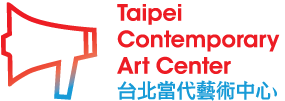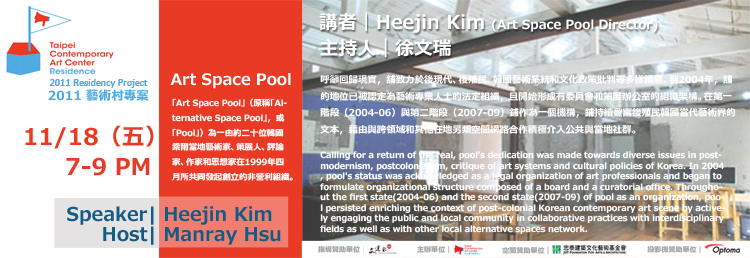[ 2011藝術村專案 ]
時間: 11/18(五) 7-9pm
講者:Heejin KIM (Art Space Pool Director)
主持人:徐文瑞
[ 2011 Residency Project]
Time: Nov. 18 (Fri.) 7-9 pm
Speaker: Heejin KIM (Art Space Pool Director)
Host: Manray Hsu
「Art Space Pool」(原稱「Alternative Space Pool」,或「Pool」)為一由約二十位韓國索爾當地藝術家、策展人、評論家、作家和思想家在1999年四月所共同發起創立的非營利組織。這是韓國在長達四十年的軍人專制後直接民主與平民主體性開始成熟的時期。「Pool」這個名字源於已故韓國現代詩人Kim Su-young最後一首詩的名字풀 Pool,意思是草。代表了根植於批判意識和對現實深刻感受的縈弱但堅忍的青年精神。詩中描述為垂落而比風更昂揚,草或象徵了藝術想像不屈不撓的精神,實證的知識和對現實的積極介入,這些仍被奉為機構的理念。
1999到2003的草創時期,舖在八零末嚴重商業與體制化的韓國藝術圈激起對全然缺乏「在地藝術語言和觀點」的討論。呼籲回歸現實,舖致力於後現代、後殖民、韓國藝術系統和文化政策批判等多樣議題。到2004年,舖的地位已被認定為藝術專業人士的法定組織,且開始形成有委員會和策展辦公室的組織架構。在第一階段(2004-06)與第二階段(2007-09)鋪作為一個機構,鋪持續豐富後殖民韓國當代藝術界的文本,藉由與跨領域和其他在地另類空間網路合作積極介入公共與當地社群。同時,隨著仁寺洞地區—鋪早期的原址—變得極度規格化與私有化,鋪放膽搬至法定洞地區,即其現址,此地至今仍保有七零年代市民日常生活場景。
「art space pool」 (formerly called. 「alternative space pool」, hereinafter 「pool」) was initiated and founded as a non-profit art organization collectively by around 20 of local artists, curators, critics, writers and thinkers in Seoul, Korea in April, 1999.
「pool」 was named after the late Korean modern poet Kim Su-young(1921-68)『s title of the last poem 「풀 Pool” (1968). Meaning “Grass” in English, Pool represents weak yet persistent presence of youth spirit rooted in critical awareness on and deep sympathy with the reality. Described as “falling yet rising earlier than the wind” in the poem, the grass may well symbolizes the indomitable spirit of artistic imagination, empirical knowledge and active engagement in reality, which is still cherished as an institutional agenda of pool.
Its initial founding period from 1999 to 2003, pool sparked an argument on the sheer absence of “local art languages and perspectives” in heavily commercialized and institutionalized Korean art scene of the late 80s. Calling for a return of the real, pool’s dedication was made towards diverse issues in post-modernism, postcolonialism, critique of art systems and cultural policies ofKorea. In 2004, pool’s status was acknowledged as a legal organization of art professionals and began to formulate organizational structure composed of a board and a curatorial office. Throughout the first state(2004-06) and the second state(2007-09) of pool as an organization, pool persisted enriching the context of post-colonial Korean contemporary art scene by actively engaging the public and local community in collaborative practices with interdisciplinary fields as well as with other local alternative spaces network. In the meantime, as the Insa-dong area, the original location of initial pool, gets extremely normalized and privatized, pool adventured to move its premise to Gugi-dong area, its current location which retains an the 70『s everyday life scene of the citizens.
[vimeo]http://vimeo.com/33522432[/vimeo]

